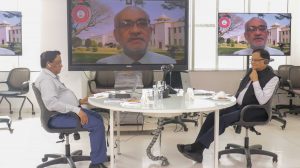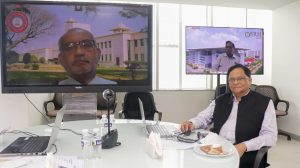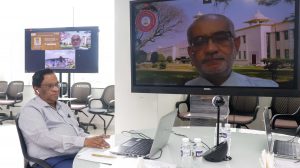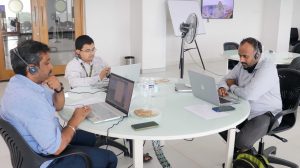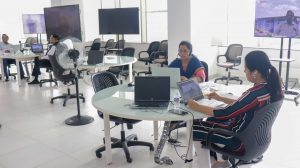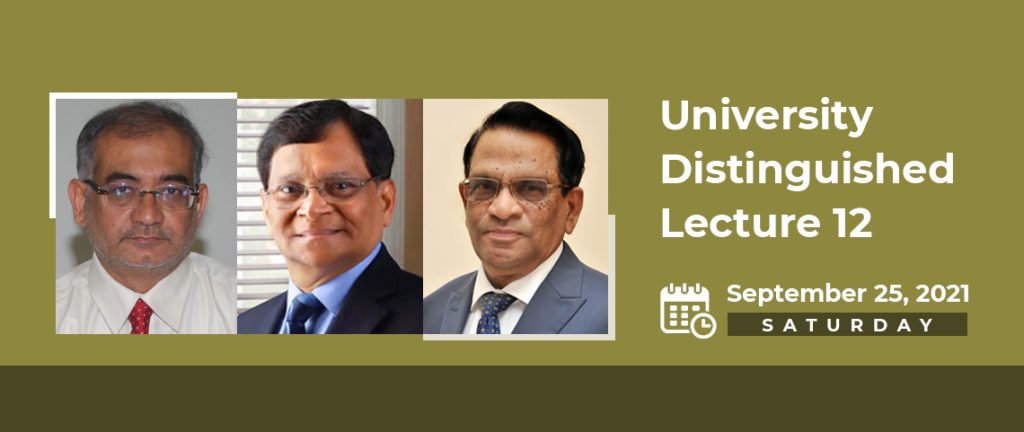 The 12th edition of the widely popular University Distinguished Lecture Series delved into the pertinent relationship between Science, Engineering and Technology. During the distinguished lecture, “Science-Engineering-Technology Synergy for Sustainable Growth”, Prof Indranil Manna well explained the correlation between the streams and how scientists, engineers and industry experts should work together for maximum societal benefits. Prof Indranil Manna, a JC Bose fellow of DST, is currently the Vice-Chancellor of BIT Mesra. The event took place on September 24, 2021, in virtual mode.
The 12th edition of the widely popular University Distinguished Lecture Series delved into the pertinent relationship between Science, Engineering and Technology. During the distinguished lecture, “Science-Engineering-Technology Synergy for Sustainable Growth”, Prof Indranil Manna well explained the correlation between the streams and how scientists, engineers and industry experts should work together for maximum societal benefits. Prof Indranil Manna, a JC Bose fellow of DST, is currently the Vice-Chancellor of BIT Mesra. The event took place on September 24, 2021, in virtual mode.
In his address, Prof Indranil Manna asserted that India is no longer a poor country but a mighty economic power with a 3 trillion dollar economy. “We are considered as one of the strongest nations of the world today, not because of the population or because of the youth living in the country, but we are the ones who could send mission to mars at the cheapest cost, and also successfully identified the existence of water on the surface of the moon. Further, we are one of the very few nuclear harnessing nations of the world,” said Prof Manna.
Science began its journey in order to find out the truths of nature. “Why?”- this question is the driving force behind Science. Though Science unravels nature and truth primarily through curiosity or need inspired acts, and the occasional outcome is significant earth-breaking discoveries, sometimes it needs technology to prove it. On the other hand, Engineering deals with “How?” and for Technology, the question is “What?”. Engineering produces certain products and devices by specific designs and inventions. However, what is absolutely essential for the society is Technology, knowledge through the path of knowing ‘why’ and ‘how’ to know ‘what’ sells. Thus, Prof Manna prescribes SET, a conjugation of Science+Engineering+Technology, as the way forward for maximum societal benefits.
Prof Manna explained that innovation means new ideas, creative thoughts, new imaginations in the form of a device or method. It is incremental, cross-disciplinary, directed and translational. Innovation matures itself via Engineering or Technological interventions. Further, sustainability is a composite concept that means the ability to maintain the desired rate or level, avoiding depletion of resources, energy or disturbing the related ecosystem.
Engineering and Technology are the key factors to sustainability. Engineers are not technicians meant only for routine production, maintenance or testing. Instead, Engineering applies the principles of science and logic to develop viable solutions to societal aspirations and challenges. The core of engineering lies in the translation, fundamental concepts to design, develop, fabricate, exploit, analyse, model, stimulate and predict,” Prof Manna elaborated.
Government of India’s Technology Vision-2035 focuses on developing the quality of life of each Indian. Science is pursuing the truth relentlessly regardless of its necessity or immediate scope of application. It provides clues, if not answers and extends as far as imagination goes. Engineering is all about enabling and providing solutions borrowing from the fundamentals of science. Technology is the last mile for societal benefit, based on scientific discovery and engineering inventions and innovations.
India is a great innovator and showcasing continuous gradual progress in it. In the Global Innovation Index (GII), India ranks 48 (2020), making it into the top 50 for the first time. Prof Manna believes that India has enough talent and potential to make it into the top 10. “Let us ensure that Science-Engineering-Technology in India complement each other and flourish together so that our society soon achieves the desired culture, growth and prosperity,” Prof Manna Concluded.
In his welcome address, Prof D Narayana Rao, Pro-Vice-Chancellor, SRM University-AP, said that the development and use of Science & Technology are critical for the achievement and sustenance of various sectors. The importance of Science and Technology to modern society and the role of the technologically educated population in promoting social and environmental developments have long been recognised. Science and technology are considered the most effective means to enhance the growth and socio-economic developments of nations. Moreover, the universalism of science and the globalisation of technological production and trade offer unprecedented opportunities for focused cooperation for scientists, engineers and the institutions that employ them to further progress in sustainable development. Even, National Education Policy-2020 advocated multidisciplinary, multi-institutional research for sustainable development.
In his concluding remarks, Prof V S Rao, Vice-chancellor, SRM University-AP, congratulated Prof Indranil Manna on delivering such a motivating lecture. He further honoured him by presenting a memento.


